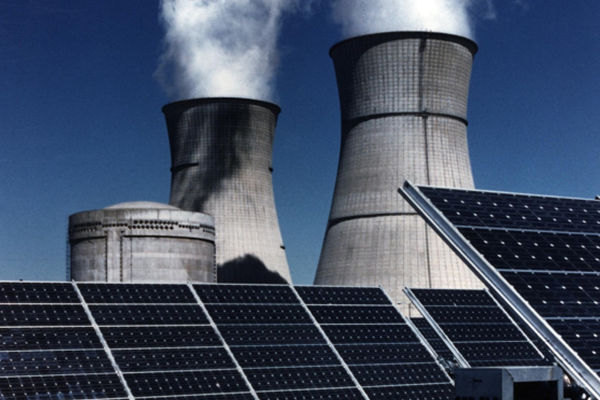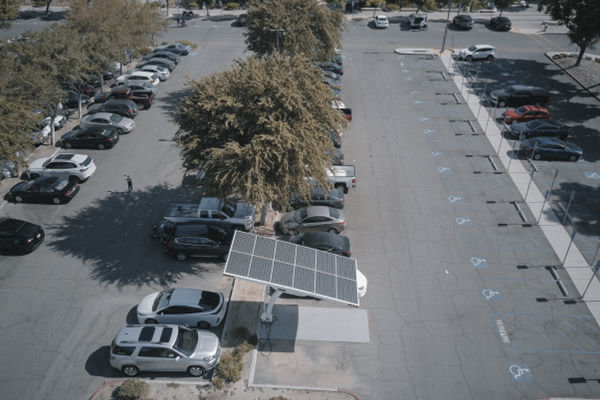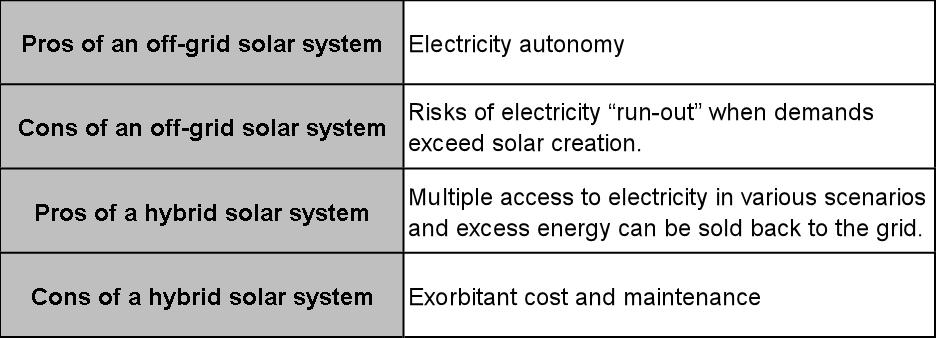Is a Hybrid Solar System Right for You? Let’s Find Out
Sourcing renewable energy for your home is great for the planet and your pocket. Solar energy is the most accessible type of renewable energy for families all over the world. It can be used everywhere; from a small farmhouse in Peru to a mansion in Los Angeles, accessing solar power is entirely possible because it comes from a resource that we all have in common: the sun.
It might seem a bit too good to be true, but with the current technology used for solar energy, your home can absorb energy directly from the sun, convert it into power, and use it to run your appliances. Basically, anything that would run up your current electric bill can rely on a solar panel system instead. If you’re ready to take the next steps, you’ll need to decide what type of system you want: off-grid, on-grid, or hybrid.
An on-grid system is just as it sounds: you’re still connected to the power grid that you pull electricity from currently. Some people choose to go off-grid, where they are not connected to any state power grids at all, simply running off of the solar energy their solar energy system collects. A hybrid is – you guessed it – a mix of the two. Let’s see if it’s right for you.
Table of contents:
- What is a Hybrid Solar System?
- How Much Does a Hybrid Solar System Cost?
- Hybrid Systems vs. Off-Grid Systems: Pros and Cons
- Finding the Right Inverters and Batteries for a Hybrid Solar System
- Making the Most Out of Solar
What is a Hybrid Solar System?
If you’re interested in a hybrid solar system for home purposes, it’s important to understand exactly what it means. If you’re asking internally, “How does a hybrid solar system work?” You’re in luck. Let’s review it.

With a hybrid solar system, you’ll stay connected to the power grid that your house currently uses, but you’ll also pull in energy from your solar powered system. Using a battery, charge controller, and inverter, a hybrid solar system can collect and store energy on the battery and send any excess energy back to the grid through the inverter.
This is a robust setup that requires a bit of equipment, but it also gives you the benefits of staying connected while you are experiencing a untoward power outage. Depending on your location, the position of your house, and weather conditions, you’ll likely be able to completely replace your energy use with solar power, but by staying connected to the grid, you’ll have a backup in case the solar setup doesn’t work.
How Much Does a Hybrid Solar System Cost?
Because they require more equipment, hybrid solar systems often come with a higher price tag. The overall cost will depend on a number of factors including where you live, how much energy you need for your household, and the type of panels you install, but we can provide an idea of what you might be looking at.
Components of a hybrid solar system: 1.Solar Panels 2.Charge controller 3.Solar Grid-tied Inverter 4.AC Isolator Switch 5.Wiring 6.Battery 7.Net metering (the device allows you to sell excess power back to the grid, but some states do not provide this service) 8.DC circuit breaker and fuses 9.DC Surge Protective Device
Then the cost might include:
-The total cost of all the components mentioned above
-Solar interconnection fees
-Labor fees
All these costs might be included in the quotations offered by your solar installers. It’s a good thing to know where your money goes. A professional solar installation company is always preferred if you decide to go with a hybrid solar power system or an on-grid solar powered system.

The average cost of materials and the installation of the solar panels themselves is about $16,000 in the US, but again, your specific situation will alter how many panels you need, changing the price. Batteries themselves cost about $8,000 and upward and you can expect to replace them every 5-10 years depending on quality and usage.
Although these prices can come with a sticker shock, it’s important to remember that investing in solar usually provides a return on investment over time. You won’t recoup your investment in a year or two, but after 5 years or 10 years of a nearly-$0 electric bill, the costs will pay for themselves.
There is also a federal tax credit offered by the US government and many other countries around the world are starting similar programs. This tax credit can reduce your tax liability and help you recover your initial investment.
For more information on solar panel prices, please read this article-- How Much Does A Solar Panel Cost? is for you.
Hybrid Systems vs. Off-Grid Systems: Pros and Cons
While the thought of going completely off-grid can be exciting, there’s a lot more lift to successfully going off-grid than many people think about. How do hybrid solar systems work in comparison to off-grid systems? Let’s find out.
Off-Grid Solar System Advantages
When you disconnect completely from the power grid in your area, you gain autonomy over the creation and consumption of your power. For many people, this is freeing, and the reduced stress of not dealing with electric companies ever again is a major benefit of going off-grid. You might recover your solar investment more quickly with the careful management of your resources because you’ll never have to pay money to an electric company again.
Remember, when you go off-grid, you’ll still need a battery to store any excess energy that your solar array collects. Then, in low-energy times such as inclement weather, you can pull energy from the battery instead of living without electricity during those times.
Off-Grid Solar System Disadvantages
If you mismanage your solar creation or consumption, you could end up in a mess of complications. When you’re off-grid, once you “run out” of energy, you’re out, and the only thing you can do is hope that your solar panels efficiently gather more energy from the sun. However, if you’re experiencing a storm or long-lasting issue, being stuck without electricity could cause many issues.
Hybrid Solar System Advantages
When you have a hybrid solar system, you still create and collect your own electricity, but if there is a situation where your use exceeds your supply – which happens often – you can pull electricity from the power grid. In emergency situations or inclement weather, being able to tap into the power grid can keep you warm, keep food on your table, and ensure your safety through it all.
However, when power grids go down, which seems to be an ever-increasing occurrence, you’ll still have your own energy storage to pull from. Hybrid solar systems offer the security of staying connected while still providing a way to utilize those systems much, much less than you used to.
Another benefit of hybrid solar systems is that they can feed leftover energy back to the power grid. When you give energy to your state’s grid, you might actually get a credit on your next energy bill. Without a hybrid system, you can’t take advantage of this benefit.
Hybrid Solar System Disadvantages
The two largest disadvantages of a hybrid solar system are cost and maintenance. With more equipment required, you’ll need to buy and replace expensive parts throughout the lifetime of your system. You’ll also need to care for and maintain a more complex setup than you would if you were off-grid entirely.
Key takeaways:

In our opinion, hybrid solar systems offer a lot more peace of mind than off-grid systems. While it’s entirely possible to use an off-grid system successfully, it requires a bit more knowledge, due diligence, and consumption management. If you have a family member that always forgets to turn that one light off, an off-grid system is probably not the best solution for your situation.
Finding the Right Inverters and Batteries for a Hybrid Solar System
If possible, invest in a hybrid battery and inverter system for your solar system if this is the route you decide to go. Buying them together will ensure maximum compatibility and easier long-term maintenance. You’ll need a lithium battery setup for your hybrid solar system such as the Ensemble Encharge Battery System. This item pairs with the Enphase Energy IQ Microinverter. This is just one example, but there are many bundles that are sold as a unit, specifically for hybrid solar systems. One thing to keep in mind is that don’t mix up a hybrid inverter which is for hybrid solar systems with a solar inverter. A hybrid inverter is usually the combination of the charge controller and the inverter charger.
When working on a budget, you can find inverters that can be installed prior to the battery installation. This is a great option because you can get the inverter set up, save a bit more money, and down the line invest in a compatible battery. While it’s not ideal to go a long time without a battery, this often makes solar installation more accessible if people are worried about the costs upfront.
The installation team that you work with can help recommend premium battery/inverter combinations, so be sure to communicate your system needs clearly. It’s a pity that Renogy do not have compatible inverters and lithium batteries for a hybrid solar system, but if you are considering high-quality solar panels, Renogy offers high-efficiency monocrsytalline solar panels such as the 450W mono solar panels.
Making the Most Out of Solar with A Hybrid Solar System
In recent years, going off-grid has been made to sound like a dream. People picture a life out in the mountains, growing their own food, and listening to songbirds all day. And while that can be very true, going completely off-grid when it comes to electricity requires a lot of work. You have to carefully monitor how much energy your system is sourcing while also looking at how much you’re using each day.
A solar wind hybrid system or simple a hybrid solar system can help you feel like you’re off-grid without requiring you to absorb the risks associated with it. With a hybrid solar system, you can still rely on the power grid in your area when you need it, send energy back to the grid to help alleviate energy needs in your area, and even get bill credits when applicable. In our opinion, the most effective way to switch to solar is by using a hybrid solar system, especially for beginners. If you’re ready to take the next steps, contact us and reach out to our team today!
Related articles:
Hybrid Solar System: Adding A Backup Battery To An Existing Grid-Tied Solar System
How Much Power Does A 4.5 KW Solar System Produce?
Is A Solar Battery Necessary For My Solar Energy System?
Building An Off-Grid Solar System With Your Child To Fight Climate Anxiety








